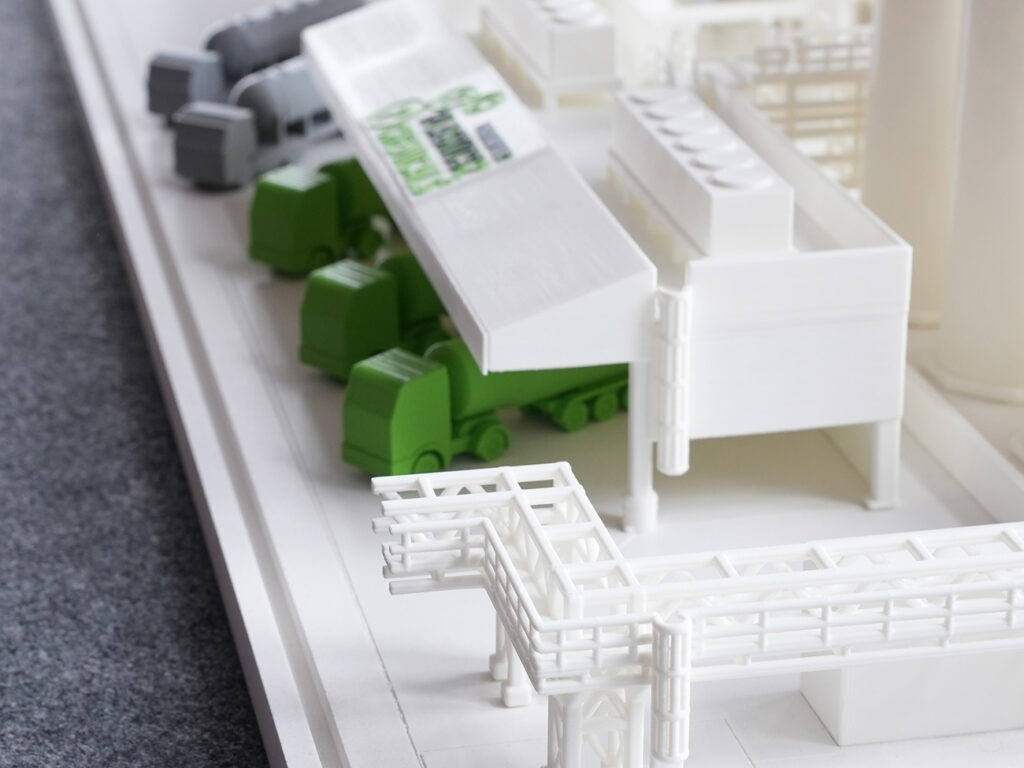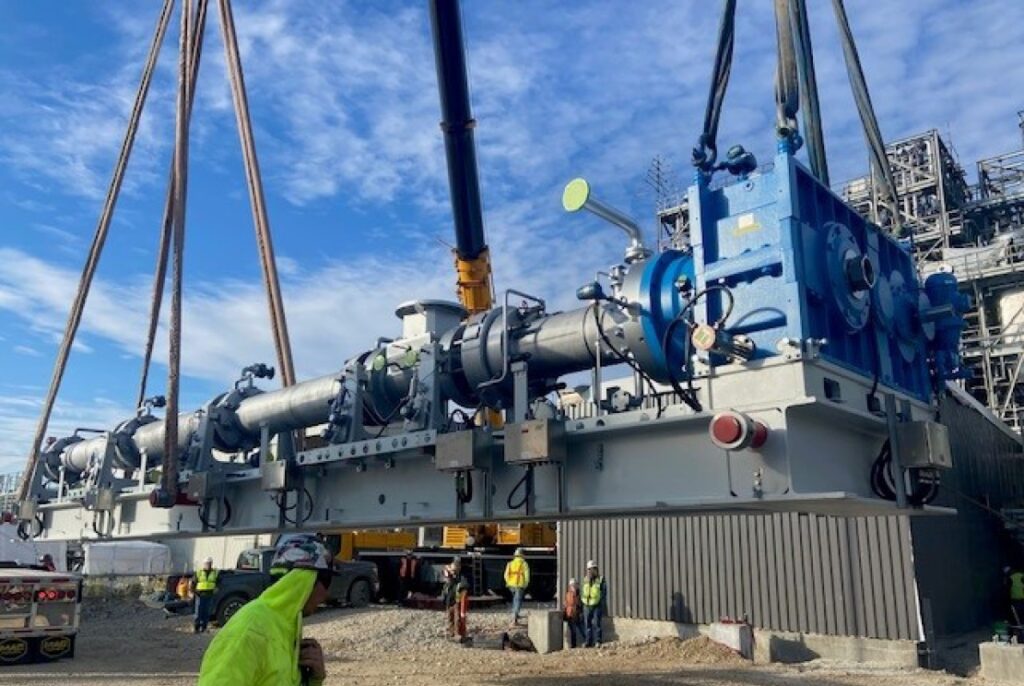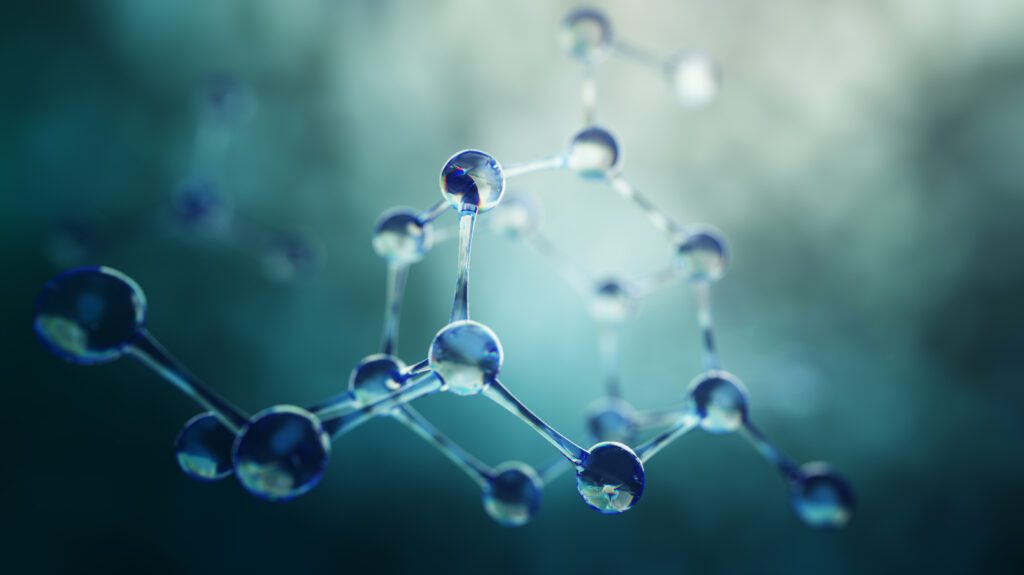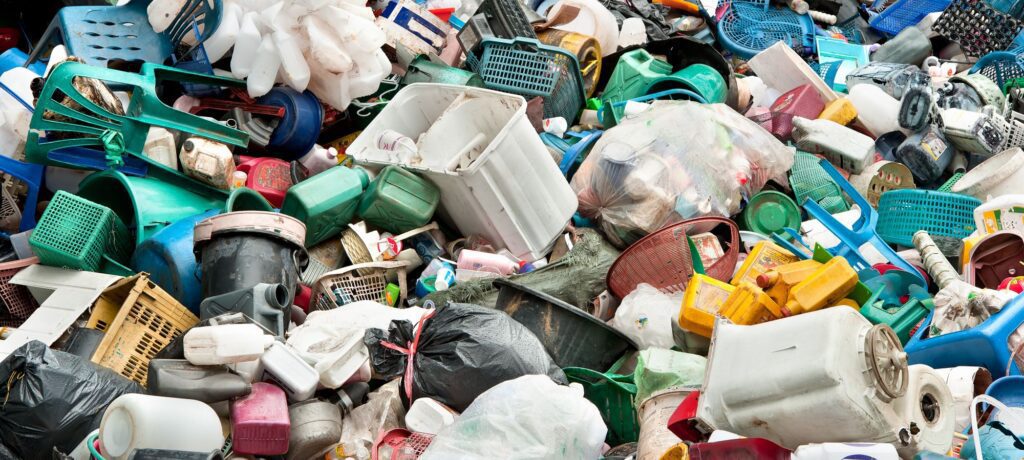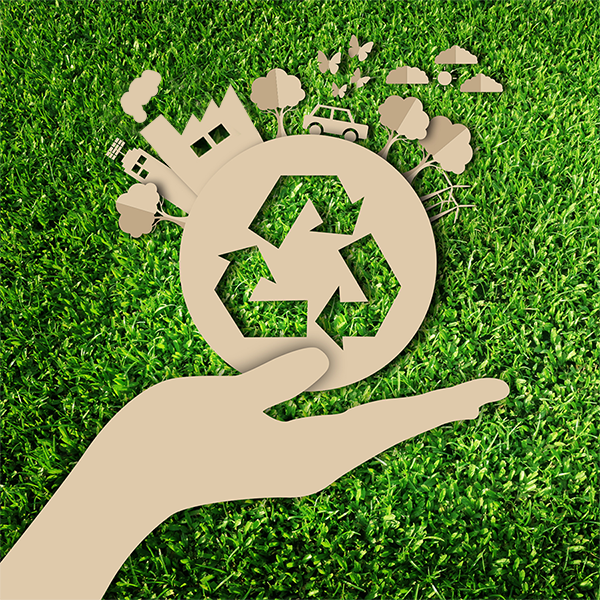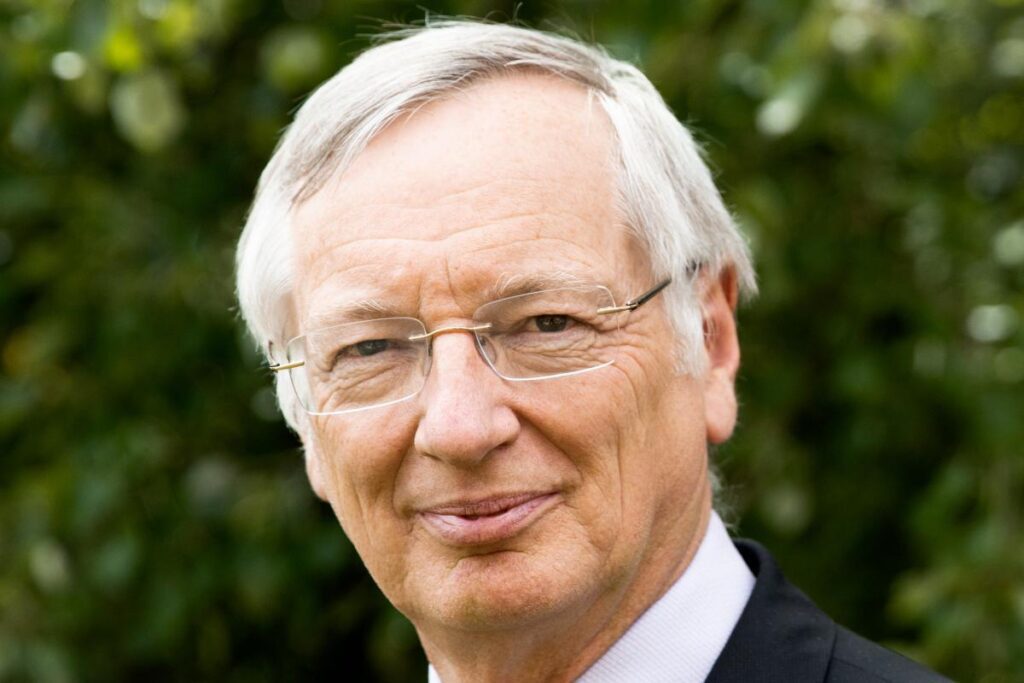Indaver has started building a new facility for recycling end-of-life plastics into valuable basic chemicals for the industry
This Plastics2Chemicals facility will recycle approximately 65,000 tonnes of end-of-life plastics and will thus become the first and largest fully-industrial plant on an EU scale. Start-up is scheduled for early 2024 with an initial capacity of 26,000 tonnes. This will be scaled up to run at full capacity from 2027 onwards. The new facility will create 50 new jobs.
Flanders is committed to sustainable recycling
The total investment amounts to 100 million euros. Indaver can also count on 7.5 million EUR in Flemish government support from Minister Jo Brouns’ innovation cabinet. 3 million EUR in support has also been awarded from the Flemish recycling hub. The project offers a sustainable solution for plastics that are currently difficult to recycle. Thanks to this innovative Plastics2Chemicals technology, Flanders can make a big step towards achieving the European recycling goals for plastics.
For the first time, the Flemish government is doing this through the what’s known as ‘repayable advances’. With these advances, the government takes on part of the risk, but they will also be recompensed if the project is successful. That way, once it’s successful, part of the subsidy will be channelled back to the Flemish government.
Flemish minister for Science and Innovation Jo Brouns: “The future will be sustainable or will not be. With the energy crisis, the transition to a circular economy is more relevant than ever. Our Flemish economy must and will be less dependent on fossil raw materials. We can do that with projects like this one at Indaver, where we break plastics back down to the basic components which can then be re-used. Flanders is a pioneer in terms of circular innovation, and that’s why we are keen to get behind this project. With the new system of repayable advances, the government bears part of the risk, but also benefits from this company’s successes. That way we can continue to support sustainable investments.”
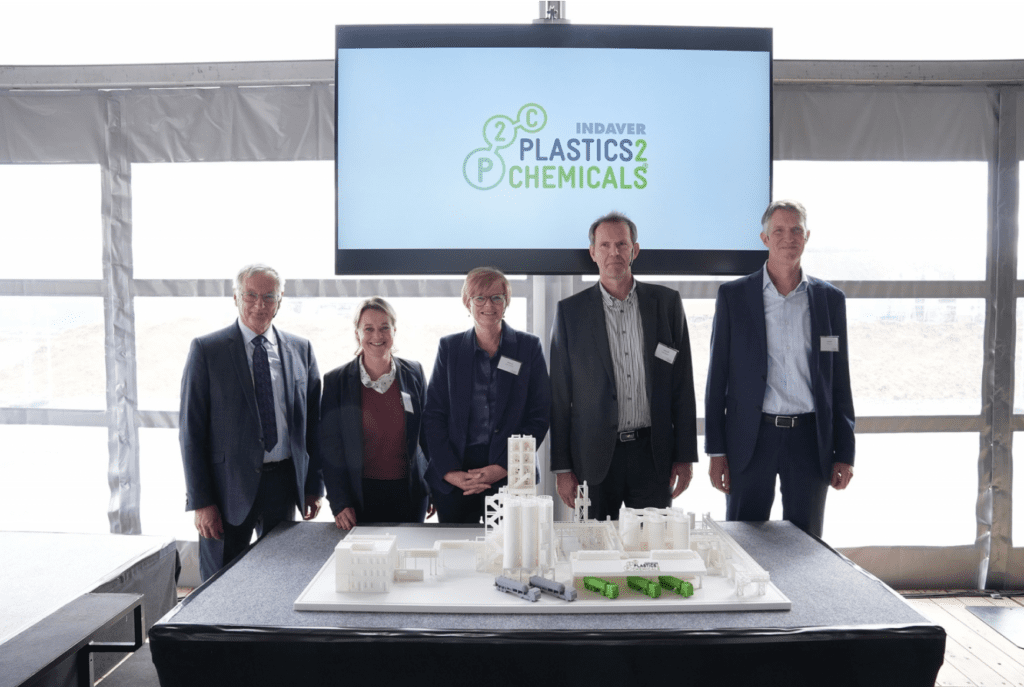
Indaver has started building a new facility, Plastics2Chemicals facility, for recycling end-of-life plastics into valuable basic chemicals for the industry. Paul De Bruycker, (CEO, Indaver,) Erica Caluwaerts (schepen Stad Antwerpen), Kristien Schoonjans (Group Engineering Director), Stefan Opdenakker (Director Treatment IWS), Erik Moerman (Business Line Director P2C)
From a pilot to a world-scale solution
Indaver has been testing the chemical recycling process extensively since 2017, in a pilot set-up in collaboration with various Flemish universities. This R&D phase has proven that the process works with real waste streams. The quality of the recycled products has also been validated several times by P2C’s customers (i.e. the chemical and petrochemical industry). In the new facility planned for its site in Antwerp (right bank), up to 26,000 tonnes of plastic waste will be recycled in the first few years, including in separate campaigns both polystyrene and polyolefins. In a second phase, the plant will be converted into a dedicated polystyrene plant and expanded with an additional line to process up to 65,000 tonnes of plastics per year. With this industrial scale-up, we are building Europe’s largest recycling plant for depolymerisation of polystyrene in Europe and will be able to provide high-quality recycling of 50 % of Europe’s polystyrene household waste packaging.
In the future, Indaver additionally intends to build an industrial plant for polyolefins. The Port of Antwerp is a potentially ideal location for this due to the presence of the petrochemical cluster. Such recycling solutions fit in with Flanders’ objectives as a recycling hub.
Chemical recycling, a solution for end of life plastics
In its new P2C facility, Indaver will treat plastics streams that are not eligible for other types of high-quality (mechanical) recycling. This primarily concerns plastics composed of polystyrene or polyolefins. This could be household packaging waste, or other plastics fractions of household or industrial origin. The materials for the new facility will be sourced from Belgium and abroad.
The recycling process consists of a thermochemical process whereby long carbon chains in the plastic are reduced or depolymerised. The materials that are released in this way, are basic raw materials with specifications that are equal to the materials extracted from fossil streams. The quality requirements even satisfy the food industry standards. With the P2C process we are therefore closing the materials loop, a textbook example of the circular economy.
With the energy crisis, the transition to a circular economy is more relevant than ever. Our Flemish economy must and will be less dependent on fossil raw materials.
Bespoke installation, a unique process for chemical recycling
For the design and engineering of the facility, Indaver has been working with various knowledge institutions. After years of research to develop and fine-tune the process into a proprietary technology, they can move on to the actual application. For the build, Indaver is calling on renowned suppliers. The core process, from the extruder to the distillation, will be a bespoke construction to guarantee high-quality recycling. The components of this facility are used in a wide range of applications in the chemical sector, and to make new plastics from primary raw materials, but their use in the high-quality chemical recycling of plastics is unique.

Contribution to recycling goals for plastics
Europe is showing a clear ambition to offer a sustainable solution for end-of-life plastics. The goal to recycle plastics has been translated into European law. With the EU packaging directive, the European Union has expressed its ambitions in terms of recycling. By 2030, 55% of the plastic packaging waste must be recycled. Belgium is going a step further and wants to recycle 70% of household plastic waste and 65% of plastics from industrial packaging by 2030. Moreover, a European proposal is on the table to have about one-third (30%) of plastic packaging made of recycled materials by 2030.
To achieve these goals, it is necessary to supplement the existing mechanical recycling techniques with new technology such as chemical recycling. This will make it possible to recover valuable basic chemicals from end-of-life plastics and to re-use them in almost all plastics applications.
CO2 reduction potential
The recycling of PS [polystyrene] and PO [polyolefins] into chemical building blocks contributes to the transition to a circular economy. This is accompanied by a significant reduction in CO2 emissions. In its initial phase, the P2C plant will save around 90,000 tonnes of CO2. Due to the planned expansion, this will increase to a saving of 227,500 tonnes of CO2 per year.
P2C represents a revolution in the field of the sustainable recycling of plastics.
Strategic importance for Flanders
Aside from the previously-mentioned contribution to the Flemish climate goals, P2C also helps to strengthen Flanders’ economic and industrial fabric. The development of a recycling hub in the Port of Antwerp will not only lead to direct jobs, it also serves to anchor the petrochemical cluster here. Initiatives such as the Circular Plastics Alliance indicate that access to recycled raw materials will be an important criterion for future petrochemical investments. Consequently, P2C forms a cornerstone of the circular economy.
CEO Paul De Bruycker: “Indaver is constantly striving to close materials loops without loss of quality. With this innovative Plastics2Chemicals project, we are managing to provide basic chemicals for the industry. We are thus realising our ambitions as a waste management company to play an essential role in the circular economy. P2C represents a revolution in the field of the sustainable recycling of plastics.
Direct job creation for 50 staff
In the new facility there will be jobs for approximately 50 staff. The development team itself consists of around 20 people and over the coming months it will be expanded with a team of 30 colleagues: operators, process engineers, maintenance technicians and laboratory assistants.
